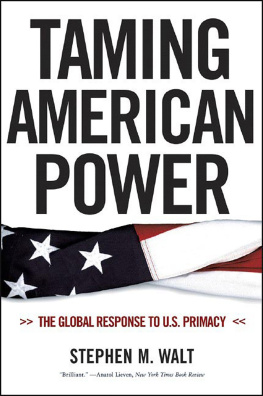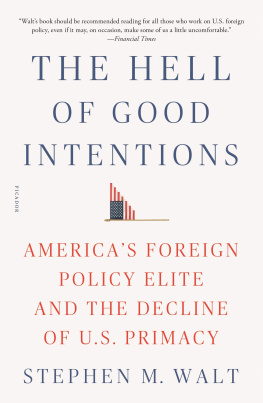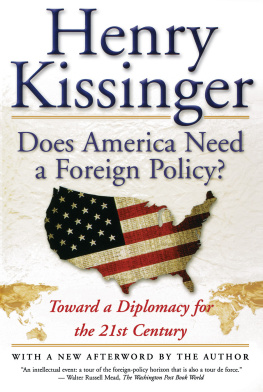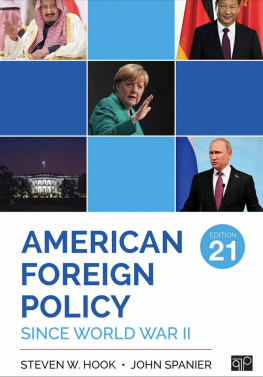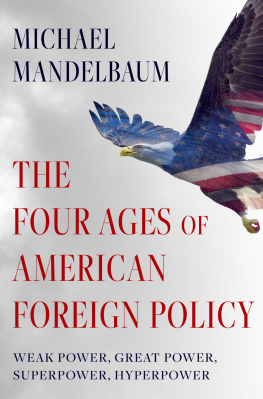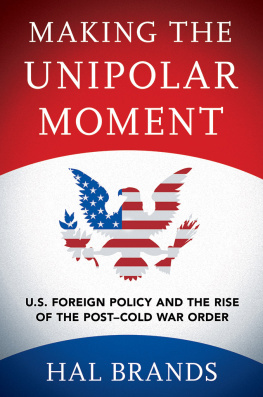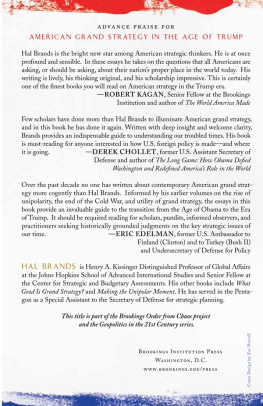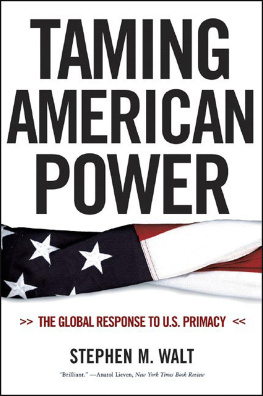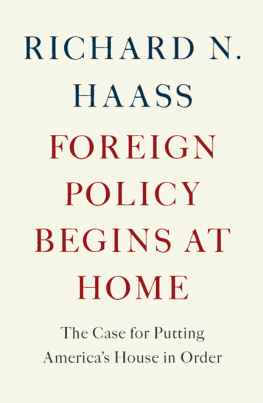
More praise for Taming American Power
[Taming American Power] offers a rigorous critique of current U.S. strategy and, even better, a clearly articulated alternative.
David Ignatius, Washington Post Book World
Stephen Walt performs the valuable service of taking an inside-out view of U.S. foreign policy, looking at it less from the standpoint of American policymakers or critics and more from the perspective of the rest of the world.... A sophisticated appraisal.
Philip Seib, Dallas Morning News
[A] blistering critique in the form of an academic treatise.
Commentary
Well-researched, well-written compelling.
Alex Coffin, Charlotte Observer
[A] penetrating study.... There is much to recommend in Walts approach.William C. Potter, Chronicle of Higher Education
This is a path-breaking book for both the informed public and policy makers, for whom it should be required reading and who would do well to follow its recommendations.Samuel Huntington, Albert J. Weatherhead III University Professor, Harvard University, and author of The Clash of Civilizations and the Remaking of World Order
Taming American Power is a brilliant book. It confirms Stephen Walts status as one of the most lucid and original thinkers on world politics today.Moises Naim, editor of Foreign Policy
Stephen Walts timing is perfect and his analysis is brilliant. Americans want to know: What went wrong in the Middle East? Why is the United States hated around the world? What happened to the unipolar moment and benevolent hegemony? Walt has the answers. Taming American Power shows why U.S. foreign policy generates resentment and how Americas allies and rivals exploit and thwart it. This important book is a must-read for anyone who believes that America needs a new foreign policy.John J. Mearsheimer,
R. Wendell Harrison Distinguished Service Professor of
Political Science, University of Chicago, and author of
The Tragedy of Great Power Politics
Instead of celebrating Americas power in the world or excoriating American hubris, Stephen Walt asks the critical questions: How are other nations responding to the challenge of American primacy? How can the United States manage its primacy so as to maintain its leadership without generating global resistance? This is a book to argue with and to admire.Michael Ignatieff,
Carr Professor of Human Rights Practice,
Kennedy School of Government, Harvard University
In this masterful book, Stephen Walt identifies the causes of Americas low standing in the world today, shows how other countries work around its unparalleled power, and then prescribes what the United States must do to restore its global influence. The writing is lucid, the logic compelling, and the prescriptions hardheaded.
Robert J. Art,
Christian A. Herter Professor of International Relations,
Brandeis University, and author of A Grand Strategy for America

Excerpts from Stephen M. Walt, Keeping the World Off Balance: Self Restraint
and U.S. Foreign Policy in America Unrivaled: The Future of the Balance of Power,
edited by John G. Ikenberry, used by permission of the publisher, Cornell University Press.
Copyright 2002 by Cornell University.
Copyright 2005 by Stephen M. Walt
All rights reserved
First published as a Norton paperback 2006
Book design by Chris Welch
Production manager: Amanda Morrison
The Library of Congress has catalogued the printed edition as follows:
Walt, Stephen M., 1955
Taming American power : the global response to U.S. primacy /
Stephen M. Walt. 1st ed.
p. cm.
Includes bibliographical references and index.
ISBN 0-393-05203-6 (hardcover)
1. United StatesForeign relations2001 2. Balance of power. 3. International
relations. 4. World politics21st century. I. Title.
JZ1480.W35 2005
327.73dc22
2005011136
ISBN-13: 978-0-393-32919-3 pbk.
ISBN-10: 0-393-32919-4 pbk.
ISBN 978-0-393-29271-8 (e-book)
W. W. Norton & Company, Inc., 500 Fifth Avenue, New York, N.Y. 10110
www.wwnorton.com
W. W. Norton & Company Ltd., Castle House, 75/76 Wells Street, London W1T 3QT
For Gabriel and Katherine
CONTENTS
I dread our own power and our own ambition; I dread our being too much dreaded.... We may say that we shall not abuse this astonishing and hitherto unheard-of power. But every other nation will think we shall abuse it. It is impossible but that, sooner or later, this state of things must produce a combination against us which may end in our ruin.
Edmund Burke
D escribing the United States as the mightiest state since Rome has become a clich, but like most clichs, it also captures an essential feature of reality. The United States enjoys a position of power unseen for centuries, and citizens around the world are intensely aware of that fact. For Americans, this dominant position is both a source of pride and an opportunity: it gives the United States a large margin of security and some capacity to mold the world according to U.S. interests and values. Within the United States, therefore, the debate about U.S. primacy is mostly about the best way to use its vast power.
By contrast, the rest of the world sees U.S. primacy as increasingly troubling. Not only is our position a direct threat to states whose interests and values clash with ours, but even our fellow-democracies now worry about the concentration of power in Washingtons hands. Over the past several years, they have also become increasingly alarmed by the ways that U.S. leaders have chosen to use that power. While Americans debate how they should use their power, the rest of the world is preoccupied with what it can do to tame American power. Some states want to contain or reduce it, others seek to harness and exploit it, but American power is a feature of the international landscape that no state can easily ignore.
This book examines the global response to U.S. primacy. It explores the different ways that the United States has used its power and explains why the rest of the world fears, resents, and sometimes hates Americas current global role. It describes the different strategies that states have devised for dealing with American power and argues that these strategies are often surprisingly effective. The United States may be far stronger than any other countryor even any likely coalition of rival powersbut other states have many ways to thwart, harass, undermine, deter, annoy, and generally interfere with U.S. efforts to promote its own interests.
Any attempt to devise an effective foreign policy for the United States must take into account the strategies of both friends and foes. Once we understand how other states are trying to tame American power, it becomes easier to devise a foreign policy that will minimize opposition and maximize global support. In particular, the global response to U.S. primacy suggests that the United States should return to a more restrained policy of offshore balancing and devote more attention to persuading others that its policies are legitimate and broadly beneficial.
Though great power like ours can be isolating, the United States cannot and should not withdraw from active engagement in world affairs. To reap the full benefits of its position of primacy, and to avoid repeating the horrors of the past hundred years, the United States must learn to conduct its foreign policy with greater wisdom and restraint. This book explains why these adjustments are necessary and outlines what a more mature foreign policy would be.
Next page
